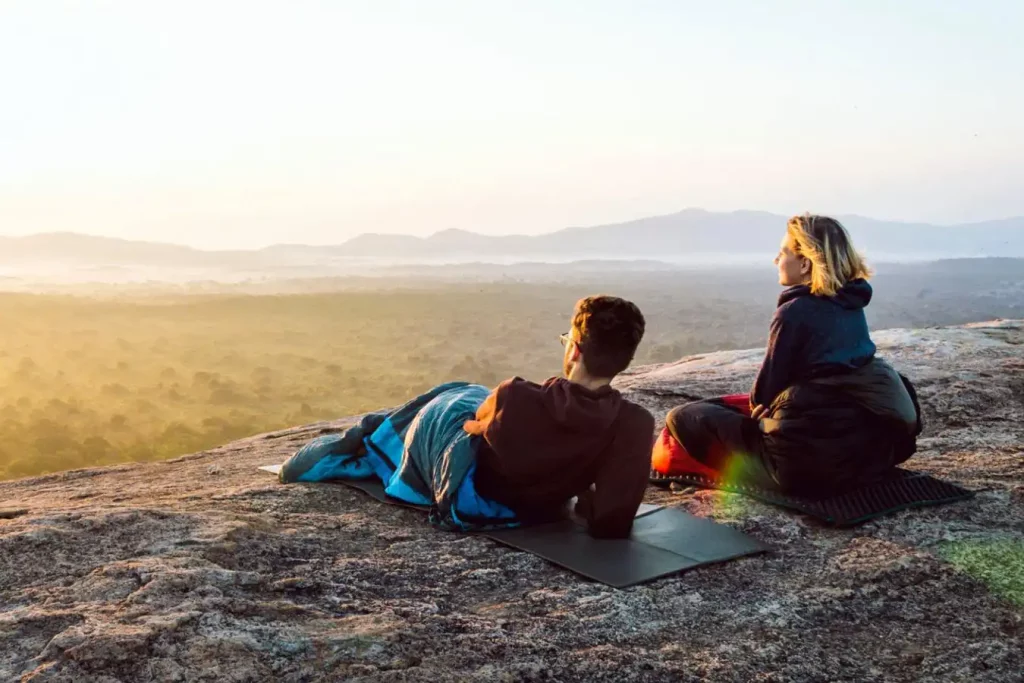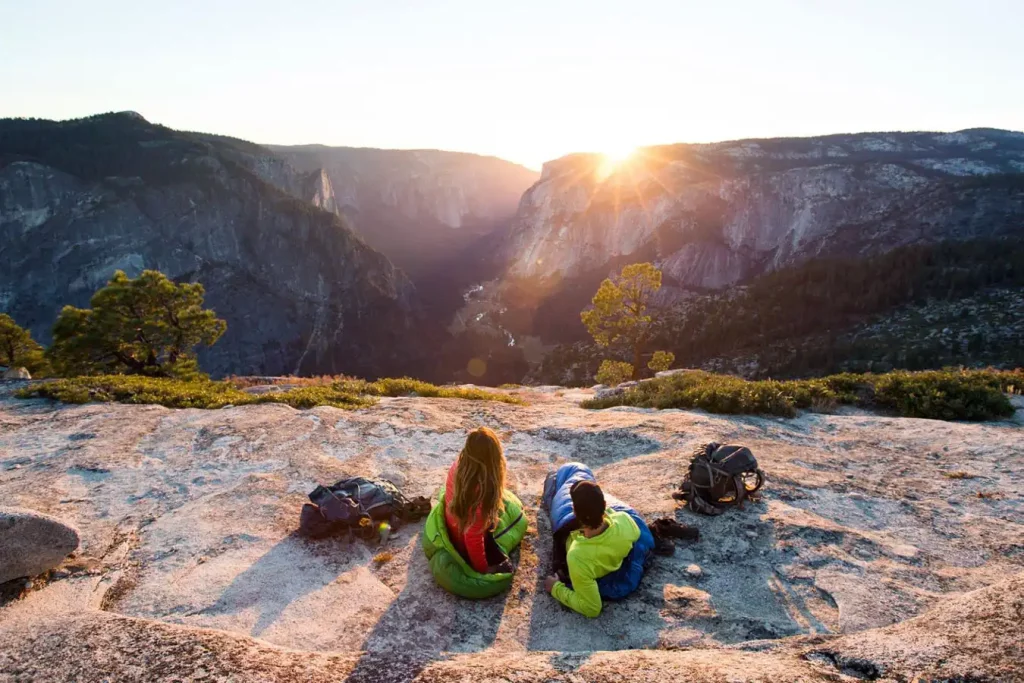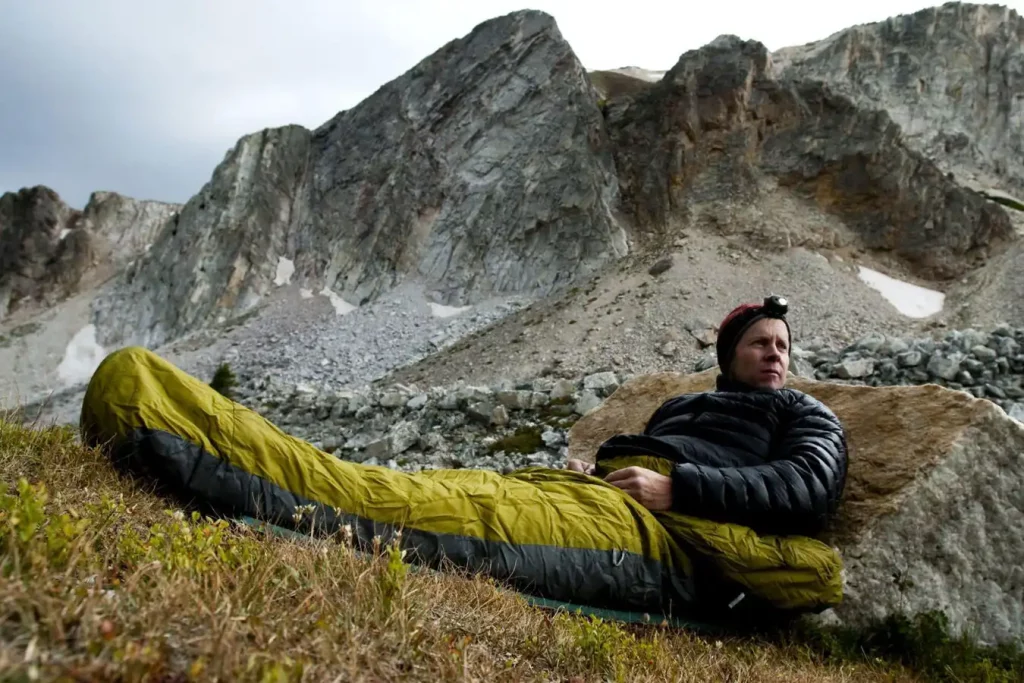What is cowboy camping, and why are adventurous souls raving about it?
Well, if the idea of ditching the tent and snoozing under the stars gets your heart racing, you’ve stumbled upon the right guide.
Stick with me, and we’ll explore this rugged way to experience the great outdoors, cowboy style!
Understanding Cowboy Camping
We’ll start by defining cowboy camping, and then we’ll delve into its historical origins.
What is Cowboy Camping?
Cowboy camping, in its simplest form, is the practice of sleeping outdoors without a tent or shelter. It is you, your sleeping bag, and the vast, open sky above. A night of cowboy camping is a night spent under the starlit canopy, with the murmur of the wilderness as your lullaby.

I remember my first cowboy camping experience. The sweet smell of the wild, the cool breeze, and the night sky adorned with a blanket of stars. It felt like nature’s grand theater and I was in the front row. It’s a unique experience that brings you closer to nature, stripping away the protective shell of a tent and leaving you exposed to the elements. An exercise in simplicity and mindfulness, if you will.
Origins of Cowboy Camping
Cowboy camping derives its name from the age-old practices of the American West’s cattle herders. It’s as authentic as it gets when it comes to outdoor experiences. It harkens back to the time when cowboys roamed the open plains, driving cattle across vast distances.
At the end of a long day, they’d find a spot, unroll their bedrolls right there on the ground, and sleep under the stars. They didn’t have the luxury of tents or campers. All they had were their trusty horses, their gear, and the vast, open sky. It was a life of grit, toughness, and deep respect for the wild – all embodied in the spirit of cowboy camping.
As we explore the world of cowboy camping, we’ll walk the path that those old-time cowboys trod, experiencing the raw, unfiltered beauty of nature. It’s an opportunity to connect with the great outdoors on a deeper level, a chance to disconnect from the digital world and tune into the rhythm of nature. A chance to see the world as those cowboys did, under the vast expanse of the open sky.
Benefits and Challenges of Cowboy Camping
Just like anything else in life, cowboy camping comes with its highs and lows. So, let’s shed some light on the potential benefits and challenges you might encounter.
Benefits of Cowboy Camping
What is it about cowboy camping that piques the interest of outdoor enthusiasts? Well, there are plenty of reasons:
Simplicity: Cowboy camping is about as simple as it gets. Just grab your sleeping bag and roll it out under the stars. No tent setup, no poles, no stakes. It’s minimalism at its best, and that simplicity can be profoundly liberating.
Connection with Nature: Without a tent, you’re fully exposed to nature and its elements. This close encounter with Mother Nature enhances your camping experience, making it feel more raw, authentic, and immersive.
Stargazing: Without the barrier of a tent roof, you can appreciate the night sky in all its splendor. Trust me, there’s nothing quite like lying in your sleeping bag, gazing up at a star-studded sky.
Challenges of Cowboy Camping
Despite its allure, cowboy camping is not without its challenges. Here are some to be aware of:
Weather: Without a tent, you’re exposed to the elements. An unexpected rain shower or a sudden drop in temperature can make your night pretty uncomfortable, if not downright miserable.
Wildlife: Depending on where you are, there might be curious critters or potentially dangerous animals about. Sleeping out in the open might make you feel a bit vulnerable.
Privacy: If you’re camping in a popular or crowded area, you might lack a bit of privacy without a tent.
To know more: What is Sky Camping
How to Cowboy Camp
Cowboy camping might seem simple, but it requires thoughtful preparation. So, let’s delve into some practical advice.
Selecting a Suitable Campsite
Your choice of campsite can make or break your cowboy camping experience. Ideally, you want a flat area, preferably with some natural shelter from wind or rain. Always respect nature and follow the Leave No Trace principles. Oh, and keep an eye out for ant hills or other critter homes – you don’t want unexpected roommates!

Essential Gear for Cowboy Camping
Despite the minimalism of cowboy camping, some gear is non-negotiable. A sleeping bag appropriate for the weather, a sleeping pad for comfort, a tarp or bivy sack in case of rain, and of course, your trusted headlamp for those nighttime necessities.
Safety Considerations
Safety is paramount when cowboy camping. Always check the weather forecast before you set out. Be aware of your surroundings – know what wildlife is in the area and how to respond to an encounter. Carry a first aid kit and let someone know your plans before you go. And remember, it’s all about respect – for nature and for your own limits.
Read More: What is Bushcraft Camping
Pros and Cons of Cowboy Camping
To give you a balanced perspective, let’s take a closer look at the advantages and disadvantages of cowboy camping. Remember, what might be a pro for one person could be a con for another—it all comes down to personal preference.
Advantages
Connection with Nature: As I mentioned earlier, cowboy camping offers an unfiltered encounter with nature. There are no walls, no barriers. Just you and the great outdoors.
Cost-Effectiveness: No need for expensive tents or RVs. All you need is a sleeping bag, a sleeping pad, and the open sky. It’s an affordable way to enjoy camping.
Freedom and Flexibility: With fewer pieces of equipment, you can easily move your camp if the need arises. Plus, you have the freedom to set up camp pretty much anywhere it’s legal to do so.
Disadvantages
Exposure to Elements: Without a tent, you’re more exposed to weather changes—whether it’s a sudden downpour or a strong gust of wind.
Lack of Amenities: Without a tent, you lose a certain level of comfort and convenience. There’s no separate space for changing clothes or storing gear.
Wildlife Encounters: While it’s exciting to be close to nature, it also means you’re more exposed to wildlife. Depending on where you’re camping, this could range from harmless insects to larger, potentially dangerous animals.
Tips for a Successful Cowboy Camping Experience
Cowboy camping is an art that becomes more enjoyable as you gain experience. Here are some extra tips to enhance your cowboy camping experience:
- Always check the weather forecast before you head out.
- Invest in a good quality, lightweight sleeping bag (Amazon) and sleeping pad for comfort.
- Consider using a bivy sack or a tarp to protect against sudden weather changes.
- Always carry a headlamp or flashlight.
- Be aware of local wildlife and know what to do in case of an encounter.
FAQs about Cowboy Camping
How do you camp like a cowboy?
How do you deal with bugs in cowboy camping?
Is there such thing as cowboy camp?
What is a cowboy’s spike camp?
Conclusion
Cowboy camping is a unique, immersive way to experience the outdoors. It’s about shedding the unnecessary, embracing the simplicity, and sleeping under the twinkling canopy of the night sky. It offers a rare chance to connect with nature in its rawest form, but it also demands respect for the elements and wildlife.
Whether you’re a seasoned camper looking for a new challenge or a beginner seeking a deeper connection with nature, cowboy camping can be an unforgettable experience. However, it’s not for everyone and comes with its own set of challenges. As long as you are well-prepared and respect nature’s rules, cowboy camping can lead to some of the most memorable nights of your life.
So, are you ready to swap your tent for a bed under the stars? Remember, the sky is the limit—literally! Happy trails, fellow adventurers.
Read next: Backpacking Vs Camping


